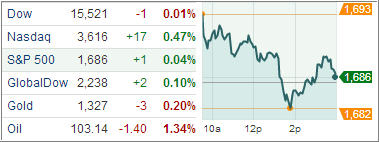U.S. index ETFs finished nearly unchanged, while the Nasdaq was able to post a modest gain as traders again appeared guarded ahead of tomorrow’s monetary policy decision from the Federal Reserve.
A rebound in Japanese equities, along with some favorable global earnings reports, a more than five-year high in German consumer sentiment, and another solid gain in U.S. housing prices provided early support. The S&P 500 added less than 0.1 percent after swinging between gains and losses during the trading session, while the Dow Jones Industrial Average fell 1.38 points.
Dow member Merck & Co reported 2Q earnings that topped estimates by a penny, as revenues declined 10.6% year-over-year (y/y) to $11.0 billion, below the $11.2 billion that the Street had anticipated. Elsewhere, fellow Dow component Pfizer reported 2Q profits also one cent north of expectations, with revenues decreasing 7% y/y to $13.0 billion, roughly inline with analysts’ forecasts. Meanwhile, Herbalife achieved 2Q EPS well above what analysts were anticipating, as revenues rose 18.1% y/y to $1.2 billion.
Although stocks endured some intraday weakness, the Nasdaq never fell into the red. The relative strength of biotechnology combined with the outperformance of technology helped the index settle in the green.
In addition to technology, industrials and utilities spent the entire day in positive territory. Utilities rose 0.3% on the back of solid earnings from NextEra Energy and Northeast Utilities. Energy and materials lagged from the open, and they finished behind the remaining cyclical sectors.
The energy space lost 0.3% as crude oil slipped 1.3% to $103.15 per barrel. Since its July 19th high, the energy component has surrendered almost 5.5%. Ahead of a busy day on the economics front, today saw some important market-moving releases.
The Consumer Confidence Index deteriorated more than expected, declining to 80.3 in July from an upwardly revised 82.1 in June, which was the highest since January 2008. Economists had anticipated a reading of 81.3. The disappointing read on sentiment came as a decline in consumers’ expectations of business conditions more than offset an improvement in their assessment of the current situation.
Meanwhile, home prices rose in May by the most in more than seven years as the recovery in U.S. residential real estate gained momentum. The S&P/Case-Shiller index of property values climbed 12.2 percent from May 2012, after advancing 12.1 percent a month earlier. Economists expected a 12.4 percent advance.
With very little change, our Trend Tracking Indexes (TTI) followed suit and barely budged from yesterday’s reading with the Domestic TTI now sporting +3.12%, while the International TTI edged up to +6.27%.
Contact Ulli
